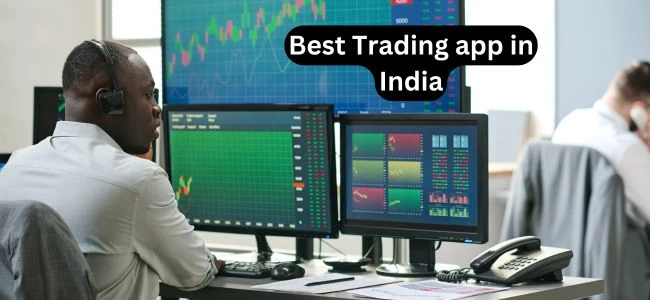Entering the dynamic world of the Indian stock market is thrilling, brimming with opportunities. Many aspire to navigate the markets effectively, perhaps even emulating the success of some of the top traders in India. But let's face it, the first hurdle is often choosing the right online trading platform from a bewildering array of choices. Confusing fee structures, different features, and aggressive marketing can make it tough to know where to begin.
We'll explore the various types of trading platforms available, delve into the must-have features that separate the good from the great, spotlight some of the leading contenders (including familiar names like Zerodha, Angel One, Fyers, and Dhan), compare them side-by-side, and offer practical advice on making your final selection. We'll also cover the advantages of online trading and answer key questions you might have. Let's find the best trading platform in India to power your trades!
Types of Online Trading Platforms in India
The Indian trading ecosystem primarily features these types of brokers offering platforms:
Discount Brokers: These brokers have reshaped the industry with their low-cost models. They typically charge a flat fee per executed order (e.g., ₹20) or offer zero brokerage for equity delivery. Their main focus is on providing robust, fast technology platforms like Zerodha Kite or Fyers Web, often with minimal advisory services. They are the go-to choice for active traders and DIY investors who prioritize low costs and efficient execution – factors often crucial for strategies employed by successful traders. Examples: Zerodha, Upstox, Fyers, Dhan, Groww.
Full-Service Brokers: These are traditional brokerage houses, often with a long history and sometimes banking affiliations (e.g., ICICI Direct, HDFC Securities). They provide a broader suite of services including research reports, stock recommendations, wealth management, and often a dedicated relationship manager. Their brokerage fees are generally higher, often calculated as a percentage of the trade value. Angel One represents an interesting evolution, merging competitive pricing with value-added research and advisory, making its Angel One share popular among investors looking for a balance.
Bank-Based Brokers: Subsidiaries of major banks (like ICICI Direct, HDFC Securities, Kotak Securities). Their main appeal is the seamless integration of banking, trading, and Demat accounts (3-in-1). While convenient, their brokerage might be less competitive than discount brokers for high-frequency trading.
Core Features to Consider When Choosing a Trading Platform in India
Selecting the best platform for trading in India involves looking beyond just the brand name. Here’s what really counts, especially if you aim for the efficiency often associated with top traders in India:
Brokerage & Other Costs: Understand the full cost structure – brokerage for different segments (Equity Delivery, Intraday, F&O, Currency, Commodity), Account Maintenance Charges (AMC), DP charges, payment gateway fees, etc. Low costs directly impact profitability, especially for active traders.
Platform Speed & Reliability: Critical. A platform that freezes or lags during peak market hours (when monitoring the Sensex or Nifty movements) can be disastrous. Look for platforms known for stability and low latency.
User Interface (UI) & Experience (UX): The platform should be intuitive. Whether it's Zerodha Kite, Fyers Web, or Dhan Web, you need to place orders, track your portfolio, and analyze charts effortlessly. A clean, efficient interface reduces errors and saves time.
Charting Capabilities: Essential for technical analysis. Check the charting software provided (TradingView is popular), the number of indicators, drawing tools, and customization options. Advanced charting is non-negotiable for serious traders.
Order Types: Does it support advanced orders like Cover Orders, Bracket Orders, GTT (Good Till Triggered), and AMOs? These are vital tools for risk management and executing specific trading strategies.
Available Instruments: Ensure the platform supports trading in all the segments you need: Equities, F&O, Commodities (check for MCX access if you need the best gold trading platform in india), Currencies, IPOs, Mutual Funds, ETFs.
Mobile Trading App: A functional, stable, and feature-rich mobile app is crucial for trading on the move. Check app store reviews and functionality. Can you execute all key actions easily?
Customer Support: Reliable and accessible support (phone, chat, email) is important when you encounter issues or need clarification. Check their responsiveness and resolution times.
Analytical Tools & Integrations: Does the platform offer built-in scanners, market data, or integrate with specialized tools like Sensibull for advanced options analysis? Accessing tools via a Sensibull login to analyze the Sensibull option chain can provide a significant edge for F&O traders.
Account Opening & Onboarding: A smooth, quick, and digital account opening process is preferred. The initial Zerodha login, Fyers login, Angel Broking login, or Dhan Trading setup should be hassle-free.
Top 10 Trading Platforms in India
While "best" is subjective, here are some of the most prominent and well-regarded platforms used widely across India, including potentially by some top traders in India due to their features:
Zerodha (Platform: Kite): India's largest discount broker, famed for Zerodha Kite's clean UI, robust tech, and ecosystem tools like Sensibull integration.
Angel One: Blends discount broker pricing with research/advisory. Strong mobile app and diverse product range.
Upstox: Tech-focused platform with competitive pricing and good charting, backed by notable investors.
Fyers (Platforms: Fyers Web, Fyers App): Known for its trader-centric features, excellent native TradingView charts, and zero AMC. Fyers login opens access to powerful tools.
Dhan (Platforms: Dhan Web, Dhan App): A newer player gaining traction with rapid product innovation, direct TradingView chart trading via Dhan Trading, and competitive pricing
Groww: Simple, beginner-friendly interface, initially focused on MFs, now a major stockbroking player with zero AMC.
ICICI Direct: Major bank-based broker offering 3-in-1 accounts and extensive research, though often with higher brokerage.
HDFC Securities: Reliable bank-based broker integrated with HDFC Bank, offering research and various investment products.
5paisa: Discount broker known for its affordable subscription plans and research offerings.
Kotak Securities: Full-service broker offering various plans, including zero brokerage options for younger traders and trade-free plans.
10 Leading Trading Platforms in India: A Tabular Breakdown
Feature Zerodha Angel One Fyers Dhan Upstox Groww ICICI Direct Kotak Securities
Broker Type Discount Discount (Hybrid) Discount Discount Discount Discount Bank-Based Full-Service/Bank
Equity Delivery ₹0 ₹0 ₹0 ₹0 ₹0 or ₹20/order* ₹0 or ₹20/order* % based (varies) ₹0 (some plans)
Equity Intraday Flat ₹20/order Flat ₹20/order Flat ₹20/order Flat ₹20/order Flat ₹20/order Flat ₹20/order % based (varies) ₹0 / Flat ₹20*
F&O Trading Flat ₹20/order Flat ₹20/order Flat ₹20/order Flat ₹20/order (Women ₹10) Flat ₹20/order Flat ₹20/order Flat ₹20/order (some plans) ₹0 / Flat ₹20*
Key Platform(s) Kite (Web/App) Angel One App/Web Fyers Web/App Dhan Web/App Upstox Pro Web/App Groww App/Web ICICIdirect.com Kotak Neo/StockTrader
Known For Tech, Simplicity, Scale Research, Hybrid Model Trader Focus, Charts Product Innovation Tech, User Base Simplicity, MF Base 3-in-1 Account, Research Multiple Plans, Research
Sensibull Access Integrated (Paid) Integrated (Paid) Yes (Via Partner Login) Yes (Via Partner Login) Integrated (Paid) Limited/No Yes (Via Partner Login) Yes (Via Partner Login)
AMC (Annual) ₹300 + GST ₹0 (1st Year), then ~₹240* ₹0 ₹0 Varies* ₹0 Varies* Varies* (some ₹0 plans)
How to Pick the Right Trading Platform for Your Needs
The absolute best trading platform in india is the one that fits you. Here’s how to choose:
Know Thyself: Are you a passive investor or an active trader? Beginner or experienced? Your trading frequency and style dictate the features and cost structure you need.
What Will You Trade? Equities only? Or complex derivatives like Futures & Options, commodities, currencies? Ensure the platform offers seamless access to your desired segments.

Budget Sensitivity: How crucial are low fees? Discount brokers win for active trading. Calculate potential costs including hidden charges.
Feature Prioritization: Do you need lightning-fast execution and advanced charting like many top traders in India might prefer (Fyers, Dhan)? Or is research paramount (Angel One, ICICI Direct)? Do you value a simple UI (Groww, Zerodha Kite)? Need robust options data (Sensibull integration)?
Test Drive (If Possible): Explore demos or check out detailed platform walkthroughs online. User reviews on app stores and forums can offer real-world insights.
Support Matters: How critical is instant support for you? Read reviews about the broker's customer service responsiveness.
Specialized Needs:
Best Copy Trading Platform in India: Use extreme caution. This concept is not well-regulated in India via SEBI brokers. Focus on learning rather than blindly copying.
Best Binary Trading Platform in India: Warning: Binary options are largely prohibited/unregulated and extremely risky in India. Reputable SEBI-registered brokers do not offer them. Avoid platforms promoting these.
Best Gold Trading Platform in India: Most major brokers (Zerodha, Angel One, Fyers, Dhan, etc.) facilitate trading in Gold via MCX Futures, Gold ETFs, or SGBs.
Benefits of Online Trading Platforms in India
Accessibility: Trade anytime, anywhere via web or mobile.
Efficiency: Execute trades rapidly in real-time.
Cost-Effectiveness: Discount brokers offer significant savings.
Empowerment: Direct control over your investments.
Information Access: Real-time market data, charts, news, analysis of indices like the Sensex, and tools for making a Nifty forecast.
Product Diversity: Access stocks, derivatives, MFs, etc., from one account.
Conclusion
Selecting the best trading platform in India is a foundational step towards navigating the stock market effectively. While platforms like Zerodha set benchmarks with Zerodha Kite, competitors like Angel One, Fyers, and Dhan provide strong alternatives with unique strengths – be it blended services, trader-centric tools (Fyers Web, Dhan Web), or continuous innovation.
Don't just follow trends. Assess platforms based on costs, reliability, usability, charting, order types, instrument availability, and support, aligning them with your unique trading profile and goals. Remember, while the right platform provides essential tools, achieving consistent success, similar to the discipline shown by top traders in India, ultimately depends on your knowledge, strategy, risk management, and continuous learning. Choose wisely, and equip yourself for your trading journey.
FAQs
Is it possible to have accounts with multiple trading platforms in India?
Yes, you are allowed to open trading and Demat accounts with multiple SEBI-registered brokers in India. Many traders do this to leverage specific features of different platforms.
How safe is online trading in India?
Trading through platforms provided by SEBI-registered brokers is regulated and employs security measures. SEBI regulations aim to protect investor interests. However, market risk is inherent in trading; you can lose capital. Always choose a registered broker and practice safe online habits.
What are the typical charges apart from brokerage?
Key charges include Securities Transaction Tax (STT), Exchange Transaction Charges, SEBI Fees, GST, Stamp Duty (varies by state), and DP charges when selling shares from Demat. Also, consider potential Annual Maintenance Charges (AMC) for your Demat/Trading account.
Is Zerodha universally the best platform for everyone?
Zerodha is India's largest broker and highly rated, but "best" is subjective. For instance, a trader prioritizing advanced charting might prefer Fyers, while someone wanting integrated research might lean towards Angel One. Compare based on your specific needs.
Do I need specialized tools like Sensibull for trading options?
While not strictly mandatory, tools like Sensibull (accessible via Sensibull login through partner brokers like Zerodha, Angel One, Fyers, Dhan) offer significant advantages for options traders. They provide payoff graphs, strategy builders, advanced Sensibull option chain analysis, and risk assessment tools that basic broker platforms often lack. For serious options trading, they are highly recommended.



